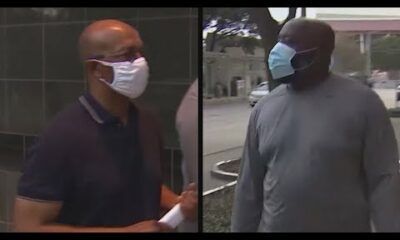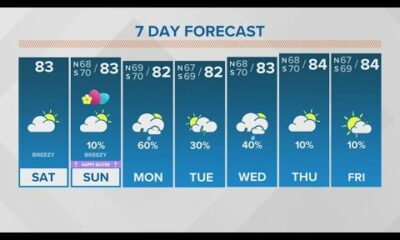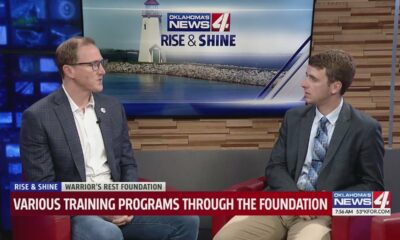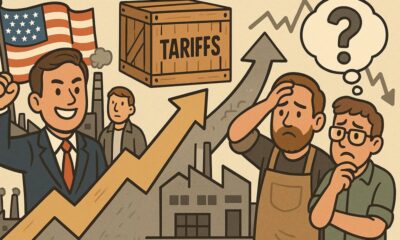News from the South - Florida News Feed
Florida legislators want to pave every rural spot left in the state

Florida legislators want to pave every rural spot left in the state
by Craig Pittman, Florida Phoenix
March 20, 2025
I’ve spent some time this month cruising through Florida’s remaining rural oases, places where there’s still some green space amid all the asphalt. I’ve seen citrus groves and stands of timber, canopy roads and cattle pastures.
When the madding crowd is driving you, well, mad, such places are a balm to the soul. And the folks I’ve talked to who live there would prefer them to stay that way.
Yet if some development-mad Florida legislators have their way, these will all go on the endangered list.
During our version of March Madness, the annual legislative session, there are two virulently anti-rural bills up for consideration, Senate Bill 1118 and House Bill 1209.
The formal name of the bills is “Land Use and Development Regulations.” I think a more accurate one would be “Get Those Dang Farmers Out of Here So We Can Cram in More Cookie Cutter Houses!”
These two bills would yank local control of development away from cities and counties across the state. The goal: Open up hundreds of thousands of agricultural acres to developers, with no chance for a review from those local governments and no way for the neighbors to object.
The two bills are also about as anti-voter as Venezuela’s Nicolas Maduro. They would overturn the decisions of an overwhelming majority in Orange and Seminole counties to impose a rural boundary on the development in their counties. The Orange County boundary was just upheld by an appeals court, by the way.
“This is urban sprawl at its worst,” Lee Constantine, a former state legislator who’s now a Seminole County commissioner, told me. “You will not see a more egregious, one-sided bill.”
Constantine is far from the only person who calls these bills awful. The president of the smart-growth group 1000 Friends of Florida, Paul Owens, wrote in an Orlando Sentinel op-ed that the bills “read like a developer’s Christmas list” because they’d “wipe out limits against development on huge swaths of high-priority natural and agricultural land across Florida, doing irreversible damage to our environment, quality of life and economy.”
I haven’t seen so many environmental groups clamoring to defeat something since last year when Gov. Ron DeSantis tried to build golf courses in the state parks. When the Senate version came up in a committee this week, several senators said they were feeling the heat from all the people objecting. One joked that her phone was blowing up and her email was smoking.
Yet when the meeting concluded, the committee approved the most hated bill of the session on a 5-3 party-line vote. One Republican senator explained that he was supporting it because he trusted the sponsor to fix whatever’s wrong with the bill.
Constantine scoffed at that. “There is no fixing this nonsense,” he told me.
The bitter taste of sprawl
Ironically, this is the year Senate President Ben Albritton says he wants to lead a “rural renaissance.” These bills seem to be aiming for something different — a rural version of the Dark Ages.
That’s no surprise. The past six or seven years have been tough ones for Florida’s rural residents, and not just because of all the hurricane damage. Big-money developers, aided by politicians from the governor on down, have painted a target on every green spot that’s left, from the Panhandle to the Keys.
Rural residents had to fight back when the governor and Legislature approved that trio of awful toll roads known as M-CORES. They’ve had to fight again when the one survivor of the M-CORES repeal, the Northern Turnpike Extension, took aim at the rural areas again.
The people trying to wipe out the farms and ranches never seem to think about how important they are to the economy. There are 44,000 commercial farms in the state, and Florida agricultural products in 2022 rang up $8.88 billion in sales.
Those open spaces provide benefits for the environment, too, such as allowing for recharge of the underground aquifer and habitat for important species such as panthers. Plus, of course, we humans need the food they produce — the corn, the beef, the milk, the strawberries, the melons, the tomatoes, and the oranges, to name but a few.
Speaking as someone who often starts his day with some Florida OJ, I have to tell you that nothing produced by urban sprawl tastes nearly as good. Doesn’t contain as much Vitamin C, either.
Don’t tear down these walls
That’s why smart cities and counties have set up boundaries to protect these remaining rural spots from being wiped out by the fast-buck artists.
Developers hate such boundaries. They’d like to play Ronald Reagan in Berlin and demand someone tear down those walls. But we need those walls.
“All of the South Florida counties have established an urban-rural boundary,” said Cragin Mosteller of the Florida Association of Counties, noting that the rural part usually includes the Everglades.
When I asked for the worst parts of the bills, David Cruz of the Florida League of Cities pointed out the provision whereby a 7,000-acre “agricultural enclave” can bypass all local zoning rules to be approved for development with a decision by an administrator — no public hearings or elected official votes needed.
That leaves neighbors with no say in what happens next door to their property, he pointed out. Why don’t their property rights count the same as everyone else’s?
These considerations are not hypothetical. Mosteller told me about the town of West Park, in Broward County. Some years ago, the town obtained an exemption from Broward’s rural boundary. Suddenly, the door was open to building all over.
“Now it’s one of the fastest-growing cities in the state,” she said. “If this bill passes, that’s what would happen in all the other rural boundaries, and the public would have no opportunity to have any input.”
But shutting up the public is just what the bill sponsor wants.
‘A lot of ickiness’
SB 1118 is sponsored by Sen. Stan McClain, who also happens to be — SURPRISE! — a homebuilder in Marion County. A 2004 story in the Ocala Star Banner reported that he builds 15 houses a year.
McClain has 11 children and 18 grandchildren, which I think means he could stay busy just building homes for his own family. If his name rings a bell, it may be because a couple of years ago he sponsored a bill to stop anyone from talking about girls’ menstrual cycles in elementary schools, even if the girls need to hear about it. Yes, the “Don’t Say Period” bill passed.
But what McClain is really committed to is the homebuilding business. In fact, the Florida Home Builders Association website lists him as executive officer of the Marion County Building Industry Association.
In all the stories on his much-hated anti-rural bill, McClain has dodged reporters seeking a comment. WKMG-TV, for instance, reported that it had “reached out to McClain several times to speak to him about the bill, and he has not responded to our requests.”
I was curious to hear his reason for sponsoring this bill, especially since his campaign website says he believes government should “not pick winners and losers with heavy-handed policies that favor one industry over another.”
Yet here he is sponsoring a bill that would clearly favor his own industry over an agriculture industry that’s so important to Marion County that they have a Farmland Preservation Area, created in 2005. That’s why even his fellow Marion County Republicans oppose his bill.
So, I tuned in this week to see what he’d say in the Senate Community Affairs Committee. Just out of curiosity, I first looked up who the chairman of that committee was and discovered it to be a fellow named — SURPRISE! — Stan McClain.
Here’s a funny thing about being chairman. While McClain was required to yield the chair while he talked about his bill, he could delay consideration to the last of the committee’s agenda, after all the other bills had been discussed at length.
That meant the committee didn’t get to McClain’s bill until near the meeting’s scheduled end. As a result, any opponents who wanted to talk about what was wrong with it had only 30 seconds each instead of the usual, which is several minutes.
As sponsor, though, McClain got much more time to lay out the reasoning behind his bill.
“The challenge of growth management is that people haven’t stopped moving to Florida and it doesn’t appear they’re going to stop anytime soon,” he told his fellow committee members. “How do we supply enough homes for people moving in?”
Then he started rambling about “inconsistent” regulations that “merit discussion,” and insisted that this bill was all about “trying to find a happy medium between growing and not.”
Somehow McClain never got around to explaining why he thinks it’s okay for the state to run roughshod over what a lot of local voters wanted. Nor did he explain why the Legislature should get more say in local planning decisions than the local elected officials.
As one of the Democratic committee members, Sen. Jason Pizzo, told him, “There’s a lot of ickiness here.”
Deseret Ranches
One other thing Pizzo said really caught my attention.
“How are we not supposed to think this is not for one specific developer in Central Florida to expand into environmentally sensitive land?” he said. But he named no names.
The Orlando Sentinel spelled out who he meant.
“The proposed state legislation is a priority for the Florida Home Builders Association as well as Deseret Ranches, the real estate arm of the Church of Jesus Christ Latter-Day Saints, which has lobbyists working on the bill,” the paper reported. “Deseret Ranches owns hundreds of thousands of acres of ranch and swamp land spanning the eastern edge of Orange County, dipping into Osceola and Brevard.”
Deseret is one of the largest calf-cow operations in the nation, but the company doesn’t want it to stay a ranch. They’ve got development plans the likes of which Florida hasn’t seen since 20 years ago, when the St. Joe Co. started converting its millions of acres of Panhandle pine plantations into vacation homes.
“Long-term blueprints outline development across an area spanning nearly 250 square miles,” Florida Trend reports. “Those plans envision 220,000 homes, 100 million square feet of commercial and institutional space and close to 25,000 hotel rooms — almost as many as Walt Disney World has.”
To aid its plans, Deseret tried to get Orlando to annex more than 50,000 acres of its land before Orange County voters could decide the fate of its rural boundary in a referendum, investigative reporter Jason Garcia noted in his “Seeking Rents” substack. “City leaders ultimately abandoned the annexation attempt, in part due to backlash from locals.”
I put in a call to Deseret’s influential Tallahassee lobbyist, Gary Hunter, to ask why his clients want to wreck the entire state just to get their revenge on the people of Orange County. For some reason he didn’t get back to me. Perhaps he was busy herding legislators the way Deseret’s cowboys herd cattle.
Absolute madness
In recent years, Florida’s cities and counties have turned into the Legislature’s favorite whipping boys, usually to benefit some major campaign contributor.
In 2019, for instance, they blocked local government from passing tree protection ordinances. In 2021, when Key West’s voters passed a referendum limiting cruise ships because of their pollution, the Legislature stepped in and blocked the referendum. In 2023, they passed a bill that prohibits local government voter referendums or ballot initiatives on land development regulation.
Because of top-down dictates from the sneaky Legislature, local governments can’t ditch fossil fuels to pick a less polluting form of energy, ban single-use plastic bags, forbid the sale of sunscreens that damage coral reefs, or promote the “rights of nature” movement.
But this bill that McClain is pushing — and that his fellow Republicans have been helping him push, despite such strong public opposition — is far worse than anything they’ve done before. It’s absolute madness and deserves to be tossed out with the trash.
But I bet if they do pass it, these flaming hypocrites will then go out on the speech-making circuit and claim they’re “small-government conservatives.” They’ll say it with a straight face, too!
YOU MAKE OUR WORK POSSIBLE.
Florida Phoenix is part of States Newsroom, a nonprofit news network supported by grants and a coalition of donors as a 501c(3) public charity. Florida Phoenix maintains editorial independence. Contact Editor Michael Moline for questions: info@floridaphoenix.com.
The post Florida legislators want to pave every rural spot left in the state appeared first on floridaphoenix.com
News from the South - Florida News Feed
U.S. small manufacturers hope to benefit from tariffs, but some worry about uncertainty
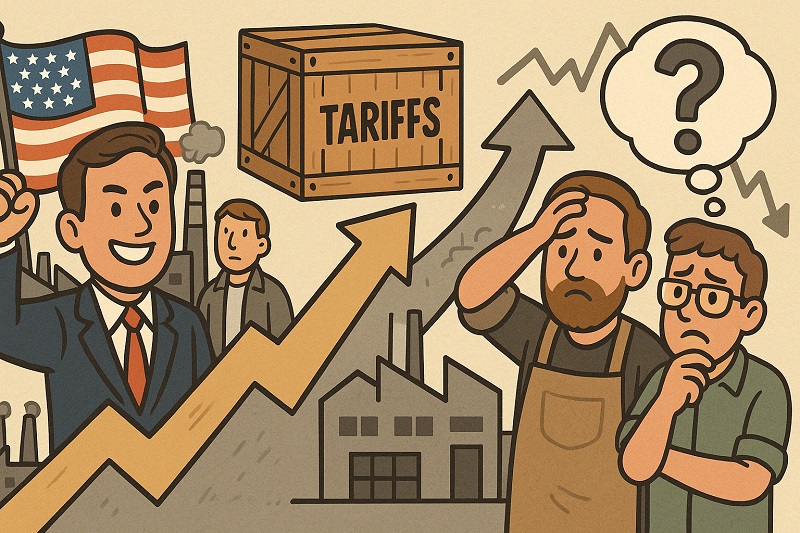
SUMMARY: Drew Greenblatt, president of Marlin Steel Wire Products, supports the Trump administration’s tariffs aimed at rebalancing trade in favor of U.S. manufacturers. He believes overseas competitors have unfair advantages, creating an uneven playing field for American workers. The administration seeks to revitalize U.S. manufacturing, which has declined by 35% since 1979, by imposing tariffs to encourage local production. However, some small manufacturers, like Corry Blanc and Michael Lyons, express concerns about the resulting economic uncertainty and potential recession. In contrast, Bayard Winthrop of American Giant remains hopeful that tariffs will lead to a resurgence of American-made products.
The post U.S. small manufacturers hope to benefit from tariffs, but some worry about uncertainty appeared first on www.clickorlando.com
News from the South - Florida News Feed
JD Vance goes to the Vatican following remarkable papal rebuke over Trump crackdown on migrants

SUMMARY: U.S. Vice President JD Vance is meeting Vatican Secretary of State Cardinal Pietro Parolin after a papal rebuke of the Trump administration’s immigration policies. Vance, a Catholic convert, has defended these policies through medieval Catholic theology concepts, which Pope Francis directly criticized. The Pope advocates for broader compassion toward migrants, contrasting Vance’s more hierarchical view of care. While in Rome for Easter, Vance attended Good Friday services at St. Peter’s Basilica with his family. He has previously criticized Francis but recently expressed prayers for the Pope’s recovery, highlighting the complex relationship between them on issues of social justice and migration.
The post JD Vance goes to the Vatican following remarkable papal rebuke over Trump crackdown on migrants appeared first on www.news4jax.com
News from the South - Florida News Feed
Federal judge extends block on Florida immigration law that led to arrest of a U.S. citizen
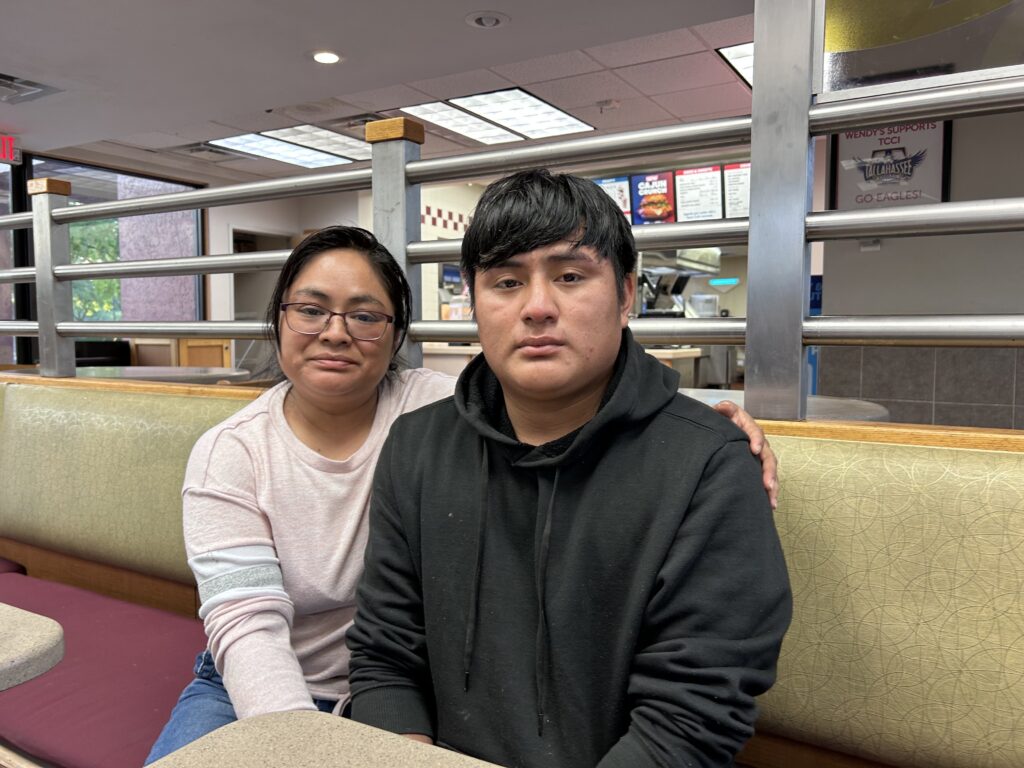
by Jackie Llanos, Florida Phoenix
April 18, 2025
A federal judge brought up the arrest in Leon County of Juan Carlos Lopez-Gomez, a U.S. citizen born in Georgia, during a hearing Friday in which she extended her block of the new Florida immigration law until April 29.
U.S. District Court Judge Kathleen Williams expressed frustration about the arrests of Lopez-Gomez and others, said an attorney representing the immigrants and groups suing the state.
At issue is Williams’ April 4 order temporarily barring enforcement of a law passed during a special session earlier this year making it a first-degree misdemeanor to illegally enter the state as an “unauthorized alien.”
A Florida Highway Patrol trooper’s arrest of Lopez-Gomez on Wednesday prompted national attention following Florida Phoenix’s reports that he was set to remain in jail because U.S. Immigration and Customs Enforcement had placed a 48-hour hold on him — even after a Leon County judge determined there had been no probable cause for the arrest.
Lopez-Gomez was released from Leon County jail on Thursday evening. The 20-year-old held his mother in a tight embrace and wept when they reunited.
“We appreciate that the federal courts have seen through this blatantly unconstitutional law, but the reality is that, without enforcement, it seems that local law enforcement and Florida Highway Patrol are continuing to ignore the judge and order,” said Miriam Fahsi Haskell, an attorney for Community Justice Project representing the plaintiffs, in a phone interview with the Phoenix. “The reality is that once a person is arrested under SB 4C and booked into jail, that person risks then having an ICE hold on them.”
Community Justice Project, the ACLU of Florida, Americans for Immigrant Justice, and Florida Legal Services attorneys are representing the plaintiffs: the Florida Immigrant Coalition, Farmworker Association of Florida Inc., and two women without permanent legal status.
David Matthew Costello, lead attorney representing Attorney General James Uthmeier, declined to comment, and a spokesperson for the attorney general’s office did not respond to the Phoenix’s questions. The other defendants are the statewide prosecutor and state attorneys.
Binding?
During the hearing at the U.S. District Court of the Southern District of Florida in Miami, attorneys representing the state argued that law enforcement is not bound by Williams’ order, Fahsi Haskell said. Another hearing is set for April 29.
“The Court enters a [temporary restraining order] prohibiting Defendants and their officers, agents, employees, attorneys, and any person who are in active concert or participation with them from enforcing SB 4-C,” Williams’ order states.
Two other men were with Lopez-Gomez when the trooper stopped the car because the driver was going 78 mph in a 65 mph zone, according to the arrest report. The driver, Estiven Sales-Perez, and another passenger, Ismael Sales-Luis, were also charged with illegal entry as “unauthorized aliens.” The driver was also charged with driving without a license.
ICE has taken custody of Sales-Perez and is holding him in a Tallahassee field office, according to the online detainee locator system.
“Florida Highway Patrol will continue to work willingly with our federal partners to engage in interior enforcement of immigration law,” a spokesperson for the agency wrote in a statement to the Phoenix.
Florida Democratic Party Chair Nikki Fried called the arrest a kidnapping.
“Where does the lawlessness of this administration stop? If this can happen to an American-born citizen, it can happen to any of us,” she said in a statement.
YOU MAKE OUR WORK POSSIBLE.
Florida Phoenix is part of States Newsroom, a nonprofit news network supported by grants and a coalition of donors as a 501c(3) public charity. Florida Phoenix maintains editorial independence. Contact Editor Michael Moline for questions: info@floridaphoenix.com.
The post Federal judge extends block on Florida immigration law that led to arrest of a U.S. citizen appeared first on floridaphoenix.com
-

 Mississippi Today6 days ago
Mississippi Today6 days agoLawmakers used to fail passing a budget over policy disagreement. This year, they failed over childish bickering.
-

 Mississippi Today6 days ago
Mississippi Today6 days agoOn this day in 1873, La. courthouse scene of racial carnage
-

 Local News6 days ago
Local News6 days agoSouthern Miss Professor Inducted into U.S. Hydrographer Hall of Fame
-

 News from the South - Alabama News Feed5 days ago
News from the South - Alabama News Feed5 days agoFoley man wins Race to the Finish as Kyle Larson gets first win of 2025 Xfinity Series at Bristol
-

 News from the South - Alabama News Feed5 days ago
News from the South - Alabama News Feed5 days agoFederal appeals court upholds ruling against Alabama panhandling laws
-

 News from the South - Florida News Feed7 days ago
News from the South - Florida News Feed7 days agoSevere weather has come and gone for Central Florida, but the rain went with it
-

 News from the South - Alabama News Feed7 days ago
News from the South - Alabama News Feed7 days agoBellingrath Gardens previews its first Chinese Lantern Festival
-

 News from the South - Texas News Feed6 days ago
News from the South - Texas News Feed6 days ago1 dead after 7 people shot during large gathering at Crosby gas station, HCSO says

